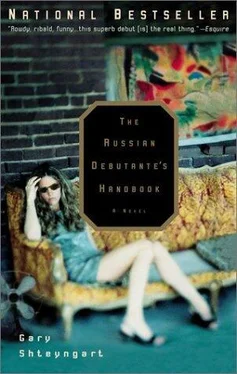“Aww, we miss you, man,” Cohen said. “You’re so busy with work and…” He stopped, tired of sounding like a jilted lover.
Across the room Vladimir saw Plank looking disgustedly into his drink as if he had been slipped a diuretic, while on the couch next to him Alexandra and Morgan gestured up a storm of conversation. What was it with these disconsolate young men? Was being the cornerstone of Prava’s elite not enough for them? Did they expect to lead meaningful lives as well? “All right,” Vladimir said. “We’ll go out by ourselves. We’ll have a good time. We’ll drink. We’ll get drunk. All right?”
“All right!” shouted Cohen. Brightening, he reached for a bottle, even as Vladimir saw Morgan glancing his way, pointing discreetly at her watch. Did she want to leave already? With Vladimir in tow? Was she not having a good time? No one eloped from a Larry Litvak party before the clock struck three in the morning. It was simply good manners.
“So how’s your writing?” Vladimir asked Cohen.
“Pitiful,” said Cohen, his big lips quivering characteristically. “I’m too in love with Alexandra to even write about her anymore…”
And there was the crux of the problem—love had come to town and Plank and Cohen had bought time shares in that ever-expanding development. Judging by Cohen’s trembling lips and wet eyes, he was already in Phase III, by the lapping pool and the Jack Nicklaus–designed golf course.
“So don’t write about her,” came a stern, gravelly voice, which Vladimir first imagined might belong to Cohen’s grandfather on his Jewish side, arrived in Prava for the approaching high holy days. He looked about for the source until Cohen pointed downward and said, “I’d like you to meet the poet Fish, also from New York.”
The poet Fish was not a midget but he brushed by that category with little room to spare. He looked like an unwashed twelve-year-old, and his hair was thick and matted, an overturned bowl of ramen noodles; despite all this he had the voice of Milton Berle. “Charmed,” the poet said offering Vladimir his hand as if he expected it to be kissed. “Everyone’s talking about Vladimir Girshkin,” he said. “It was the first thing I heard at the baggage carousel.”
“Stop it!” Vladimir said. To himself he thought: And what do they say?
“Fish is staying with Plank for a couple of days,” Cohen said. “He’s been published by an Alaskan literary journal.” And then Cohen turned instantly pale as if he had just seen someone across the room, someone who tugged at his memory in a most inopportune way. Vladimir even followed the dim light of his eyes to see who it might be, but then Cohen simply said: “I’ve got to go and retch,” and the mystery was solved.
“So,” Vladimir said, now that Cohen had left the dwarf on his hands (he hoped the little guy at least looked exotic to others). “A poet, huh?”
“Listen here,” the poet said, rising on his tippy-toes to breathe into Vladimir’s chin. “I heard you got a little something going here, this PravaInvest shit.”
“Little?” Vladimir fanned out like a peacock upon sighting his mate-to-be. “We’re capitalized with over thirty-five billion U.S. dollars…”
“Yeah, yeah, yeah,” said the poet Fish. “I’ve got a business proposition for you. Ever snorted horse tranquilizer?”
“I beg?”
“Horse tranquilizer. Just how long exactly have you been out of The City?”
Vladimir presumed he meant New York City and was shocked to remember that no matter what they did out here in Prava and Budapest and Cracow, The City—that long grid of blasted streets and no apologies—still remained the bull’s-eye of the galaxy. “Two months,” he said.
“It’s everywhere,” Fish said. “In all the clubs. You can’t be an artist in New York and not snort the horse. Trust me, I know.”
“How’s that?”
“It’s like a frontal lobotomy. It clears your head out when there’s gridlock. You think of nothing. And here’s the best part—it lasts only fifteen minutes per snort. After that you’re back to doing your thing. Some even report having a renewed sense of self. Of course, that’s mainly the prose writers. They’ll say anything.”
“Are there any side effects?” Vladimir asked.
“None. Let’s go out on the balcony. I’ll show you.”
“Let me think—”
“That’s precisely what you don’t want to do. Look, I’ve got this veterinarian near Lyon, he’s on the board of a major pharmaceutical there. We can corner the Eastern European market with your PravaInvest. And what’s a more likely distribution point than Prava?”
“Yes, well,” Vladimir said. “But is it legal?”
“Sure,” Fish said.
“Why not?” he added, seeing that the matter was not yet put to rest.
“Well, it helps if you own a horse,” he said finally. “I just bought a couple of sickly ones down in Kentucky. Come on already.” And he led him out of the room, as Morgan and Alexandra stared from their couch, alarmed at the strange spectacle of PravaInvest’s executive vice president following intently on the heels of a leprechaun.
The balcony overlooked the bus terminal, which, despite the majestic glint of the full moon, remained a tortured patchwork of cement and corrugated metal.
And then there were the buses:
From the West came the two-story, deluxe models with television screens flickering and air-conditioners tracing their green exhaust against the asphalt. These would disgorge streams of clean, young backpackers from Frankfurt, Brussels, and Turin, who immediately set to celebrating their newfound East Bloc freedom by showering each other with roadside Uneskos, flashing peace signs to the waiting cabbies.
From the East came the appropriately named IKARUS buses: terminally ill, their low, gray frames shuddering to the finish line; the doors opening slowly and obstinately to let out the tired families from Bratislava and Kosice, or the aging professionals from Sofia and Kishinev who held their briefcases close to their sparkling polyester suits as they made their way to the nearby metro station. And Vladimir could almost smell these briefcases, which, like his father’s, likely contained the leftovers of a meaty lunch packed for the road, leftovers that might now serve as dinner—Golden Prava was getting expensive for the average Bulgarian.
But Vladimir’s examination of this unhappy dichotomy, a dichotomy which was in some ways the story of his life, which brought on feelings of both elation and remorse—the elation of having a special, privileged knowledge of both East and West, the remorse of fitting finally into neither—was interrupted by the stinging, crystal-edged horse powder which the poet Fish administered to him nasally and then
not
much
happened.
Perhaps that’s an exaggeration. Something, of course, happened, even while Vladimir withdrew into the upper stories of his brain where the thin mountain air was not conducive to the cognitive process. The buses kept arriving and departing but now they were just buses (buses, you know, transport, point A to point B) and Fish rolling up and down the balcony naked, howling, and waving his tiny purple penis at the moon was just a young man with his purple penis, howling. Nothing much was happening in a big way. In fact, nonexistence was no longer so unfathomable (and how many times had he, as a morose child, shut his eyes and plugged his ears with cotton, trying to imagine The Void), but rather a fairly natural progression of this goofy happiness. The floating, bottomless joy of anesthesia.
And then the fifteen minutes were up and, like clockwork, Vladimir was noiselessly airlifted into his body; Fish was putting on his clothes.
Читать дальше












